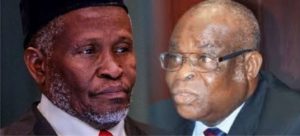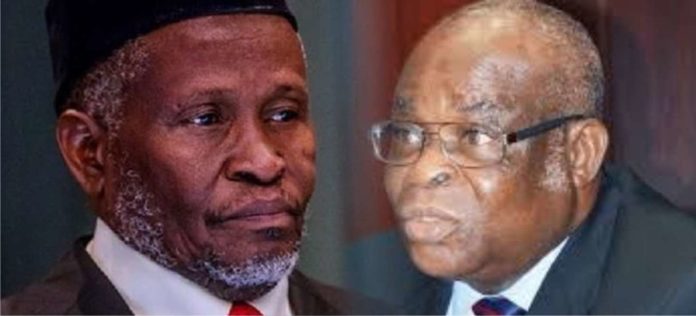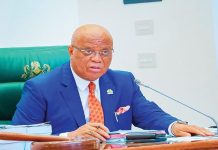
Appointment of New Supreme Court Judges.
Don’t Sell Nigeria’s Judiciary Short: It remains an Independent Branch of Government and Should not take “Orders” from the Presidency – Access to Justice
On June 9 2019, the news media reported that President Buhari asked the acting Chief Justice of Nigeria, Justice Tanko Muhammad, to initiate the process of appointing five new justices of the Supreme Court. The President said he was “…pleased to request that you initiate in earnest the process of appointing additional five Justices of the Supreme Court of Nigeria to make the full complement of 21 Justices…”‘The President said this was in line “with the government’s agenda of repositioning the Judiciary in general and Supreme Court in particular for greater efficiency, with a view to reducing the backlogs of appeals pending at the Supreme Court.

The acting Chief Justice of Nigeria appears to have accepted the invitation. On June 11th, two days after the President’ request was published, he reportedly asked Supreme Court Justices to nominate “suitable candidates for consideration for appointment as Justices of the Supreme Court of Nigeria.”
The Supreme Court has not had a full bench of 21 Justices since the transition to civil rule in 1999 in spite of calls for it to do so. Why does it have to be a Presidential “request” that should trigger the Judiciary into filling longstanding vacancies at the Supreme Court? There are notable concerns flowing from the Judiciary’s response to the Presidency’s request.
First, the Judiciary gives the impression, inferably, that it has no mind of its own, and cannot control its own business or judge what is in its own best interest. Nigeria’s judicial branch is created as an independent arm of government, with powers and responsibility over the affairs of the Judiciary. The Constitution and the Nigerian people expect the Judiciary to exercise full autonomy over matters relating to the appointment, discipline and removal of judges without interference from other branches of government, just as the Judiciary does not interfere in appointments made by other arms of government. The Judiciary has not told the Presidency when, for example, to appoint cabinet Ministers since May 29, 2019 when this administration began another term. The Judiciary ought to march to the beat of its own drum not another. The move to fill-up all vacant Supreme Court positions, following from the President’s advice or direction, unfortunately casts the Judiciary as an institution that lacks real substance in the concept of its independence; as a lackey arm, sub-ordinate to the direction of the executive branch.
Given the Presidency’s role in the sobering events leading to the removal of the past Chief Justice of Nigeria, Hon. Justice Walter Onnoghen (rtd) and the instatement of a new (acting) one, the Nigerian Judiciary ought to maintain considerable distance from other branches of government, as part of its efforts at rebuilding its public image that has, for a long while now, remained below par. It has not done so in this case but is, rather, further hurting its public perception and sending an invidious, counter-productive message to Nigerian judges nationwide that the Judiciary should take cognizance of the body language of the executive, and hearken to its requests, wishes and demands.
Secondly, even in initiating the process for appointments to the Supreme Court, the (acting) Chief Justice is also not adhering to the terms of the Extant Revised NJC Guidelines & Procedural Rules For The Appointment of Judicial Officers of All Superior Courts of Record in Nigeria made on 3rd Nov. 2014 made by the National Judicial Council, of which he is Chairman.
The Rules require, with respect to appointment of Justices to the Court of Appeal and the Supreme Court, that the President of the Court of Appeal/Chief Justice of Nigeria write “to Heads of Courts, serving Justices of Court of Appeal/Supreme Court of Nigeria and President of the Nigerian Bar Association asking for nomination of suitable Judicial Officers/Legal Practitioners for appointment as Justice of Court of Appeal/Supreme Court of Nigeria”. The Rules show that nominations for Supreme Court positions must come from a broad spectrum of officials and persons and not from the Supreme Court Justices alone. The Guidelines show that even academics can be considered, and not only serving Judges/Justices or practicing lawyers. The acting Chief Judge’s stipulated eligibility criteria would effectively exclude academics from being considered for appointment to the Supreme Court in violation of the existing Judicial Appointment Guidelines.
Finally, Access to Justice urges the acting Chief Justice of Nigeria to re-consider the exigencies of appointing new Supreme Court Justices at this time. While the Supreme Court will do with additional Justices, the circumstances and context within which any appointment will take place now are not expedient for the Judiciary’s integrity. Many Nigerians (and members of the international community) will see any appointments to the Supreme Court at this time, coming at the behest of the Presidency, as an extension of the government’s ploy to exercise political control of the court, and influence the outcomes of election petitions that come before it. No matter how fairly or neutrally the Supreme Court decides major election cases following any new appointments, there will always be some doubt, among many, whether the government did not, in some way, orchestrate the outcomes if new Justices sit on a case, particularly if the outcome is favourable to the ruling party. Public perception of the Judiciary’s independence is a very vital and delicate element of the judiciary’s autonomy and integrity in a democratic society.
Nigeria’s Judiciary is in dire straits, and has been bumping along the bottom for a long time and it will take a great deal of effort and enterprise to bring it out of the woods. Undoubtedly, the urgency of action to rebuild and reform is so compelling not to be unnoticed. Nigeria’s acting Chief Justice should, therefore, at this critical time, pursue policies and priorities that revitalize public trust in the judiciary, not those that will further alienate the Judiciary. Respectfully, his focus should centre on transforming Nigeria’s Judiciary into a strong and robust institution that can truly champion Nigeria’s struggle for good governance and the rule of law. Filling court vacancies at the prompting and instance of the executive arm of government will not help the cause of the Judiciary at this moment in time.
Joseph Otteh, Convener, Access to Justice
Newswire, we present the world of law and the issues that engage them. This edition is yet again, ‘Mind-blowing’. Go get your copy(ies) Now!

Do you need to be heard? Or your articles published? Send your views, messages, articles or press release to: newswiremagazine@yahoo.co.uk >>> We can cover your (LAW) events at the first Call: 08039218044, 08024004726
-Advertisement-
Grab our latest Magazine, "Chief Wole Olanipekun, CFR, SAN, A man of wide horizons and deep intentions". Get your order fast and stress free.
For more details about Newswire Law&Events Magazine, kindly reach out to us on 08039218044, 09070309355. Email: newswiremagazine@yahoo.co.uk. You will be glad you did






